The children living with the world's rarest diseases
- Published
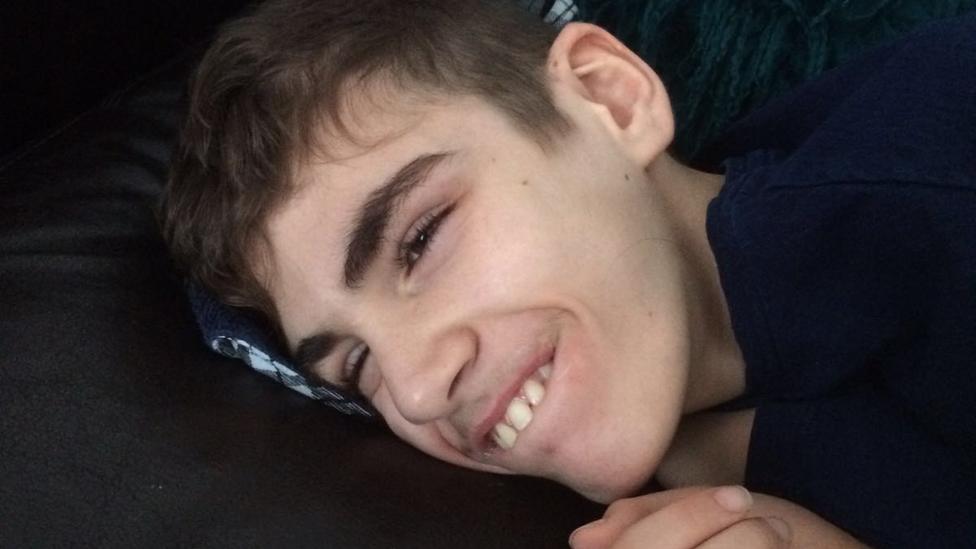
Imagine having a disease so rare it doesn't have a name - or even another sufferer. On the rarest of days - 29 February - three families mark Rare Disease Day.
It took the Torrances three years to get their youngest son Dylan, now 12, diagnosed with Partial Triplication 15 - a mutation of his 15th chromosome.
It is an illness affecting only 19 people globally, and he is the only person to have this specific defect.
His mum, Janie Torrance, says she was pleased with the diagnosis "because it was doing my head in that no one knew what it was".
The condition is so rare it hasn't been given a name. The received diagnosis is just a straightforward description of what's happened to his chromosome.
"The first thing you try and do is find someone else with it - and to be told there was no-one was quite a blow."
Each person has 23 pairs of chromosomes. On Dylan's 15th, one of the pair is longer and that region has been triplicated. It's this rare situation which causes all the problems.
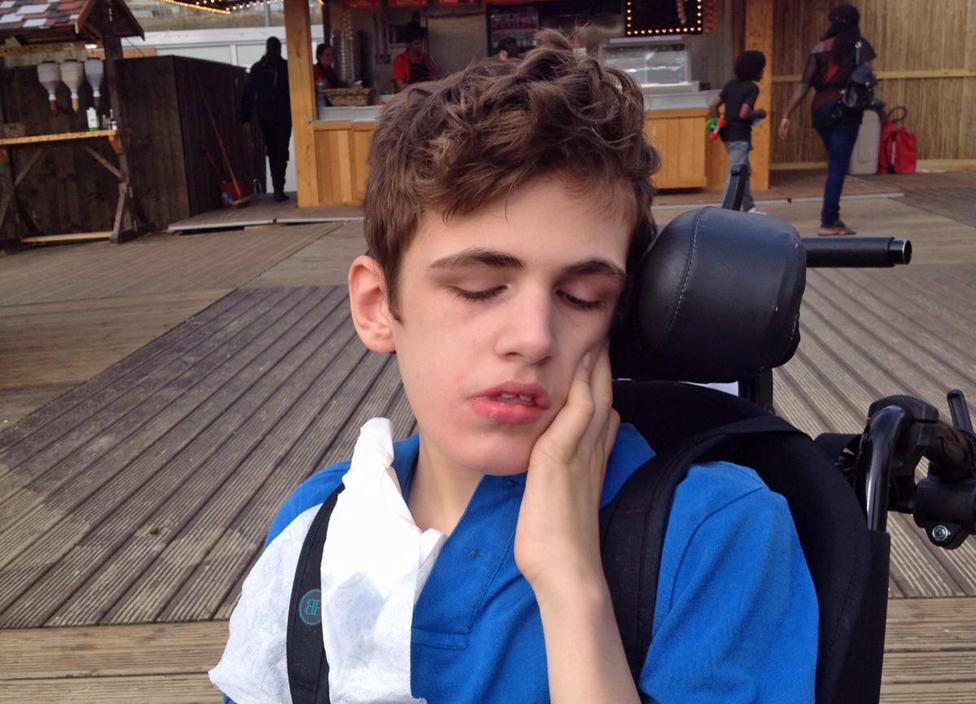
Dylan attends a special school when he is well enough
Dylan is unable to speak, has severe epilepsy and uses a wheelchair.
Despite a normal pregnancy, Janie says her son would not feed, remained floppy and was uninterested. As a baby, Dylan was different to his brother who was "like a ferret".
She says it took persistence to get a genetic test carried out which confirmed the disease when he was three.
"I'm positive about life. I look at Dylan and I think 'how can I moan about my situation' when my son goes through this every day? He's so positive.
"At the moment there is no cure, but I'm hoping someone very clever will be able to work out something."
Despite providing constant care, the family try to maintain some normality, with Janie working one day a week as a hairdresser and going to the gym, as well as ensuring their eldest son, 14-year-old Callum, does not miss out.
Dylan also has a busy life enjoying respite care at Haven House Children's Hospice in Woodford, Essex and going to a specialist school when he is well enough.
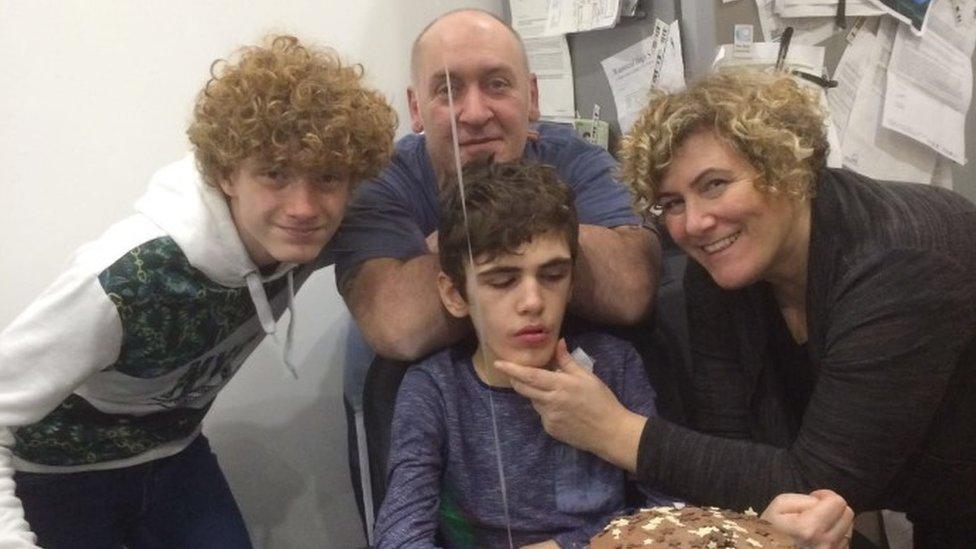
The Torrance family celebrate Dylan's 12th birthday - nine years after his diagnosis
Rare Disease Day is a chance to raise the awareness of the 60 million people world-wide affected by 6,000 rare diseases.
Nick Meade, from Rare Disease UK, says the illnesses are clarified as those affecting fewer than one in 2,000 people - cystic fibrosis and haemophilia are included in this definition.
The low number of patients can impact the development of treatments and often there is no option but palliative care.
"If you've only got 50 people with a condition, then research into that condition is much harder, because you've got fewer people to work with. The quest for a diagnosis can take up to 20 years."

What defines a rare disease?
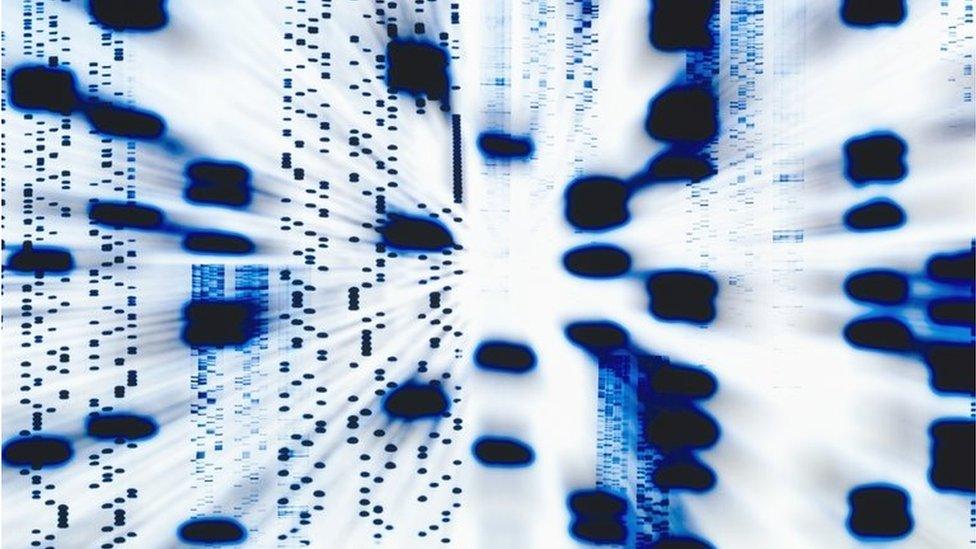
The pattern shows the precise sequence of the bases that forms DNA
A rare disease is defined as affecting fewer than one in 2,000 people
80% of rare diseases have genetic origins, whilst others are the result of infections, allergies and environmental causes
There are often no existing cures
30% of rare disease patients will die before they are five years old
Source: Rare Disease Day, external

Currently there is no central database listing every rare disease, although Public Health England is developing one. Meade says this will bring the same level of surveillance as in the cancer world, and bring detail which will aid understanding.
In 2008, five-year-old Husna Naee was taken to hospital by her parents where they say they felt like they "literally lost her overnight".
Her mother, Rahna Nabi, says: "She became unwell with a viral infection, she went into hospital for what we thought was dehydration and came out 10 days later in a wheelchair having forgotten how to lift a pencil."
Diagnosed with the life-limiting Friedreich's Ataxia disease, Husna is experiencing progressive damage to the nervous system and heart and losing her mobility, eyesight and hearing. She also has diabetes and Asperger's Syndrome.
Rahna says: "There is nothing worse than being told that your child will die slowly before your eyes.
"We were told Husna would gradually deteriorate, lose the use of her legs and arms, become blind, deaf, lose the ability to eat, swallow and speak - until eventually she becomes completely incapacitated.
"There was nothing we or anyone could do as there was no known cure."
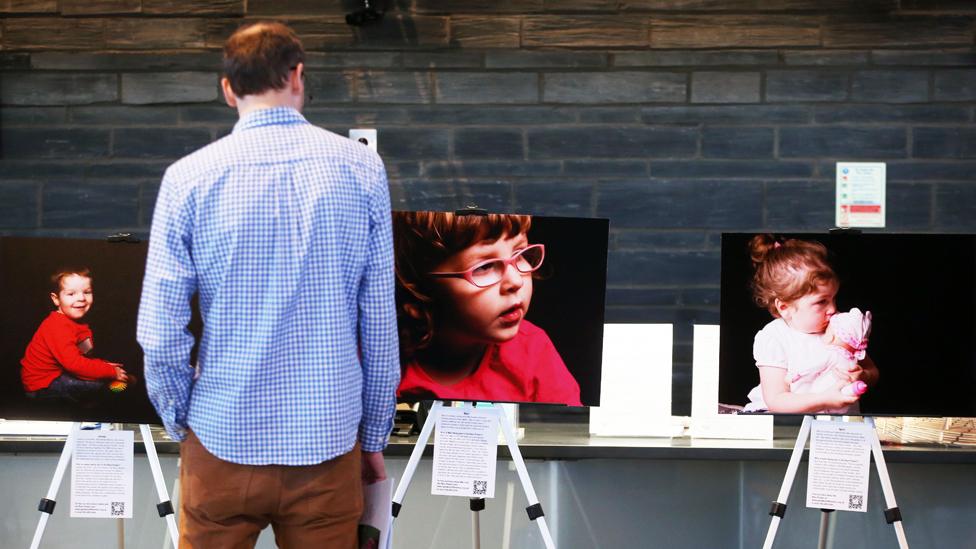
Rare Disease UK are hosting events around the UK to raise the profile of the 6,000 rarest illnesses
She describes her daughter as "very determined and high-spirited", but says that most basic tasks are a "struggle" and now, aged 16, Husna understands what's happening to her.
Rahna says her family can't believe the situation, calling it a "crash course in the disabled world". She describes it as "a dark grey cloud coming over your head and it's not shifting".
One of the greatest tolls, she says, was on Husna's two brothers - one older, one younger - who went through a period of "mourning" for the sister they had once known and who now focus on creating positive memories of her.
"There was a lot of heartache because rare diseases mean you lose the child you thought you were going to have," Rahna says.
"There's literally nothing you can do except make them as happy as possible."
She says the family try to focus on what Husna can do, not what she has lost, and credits the family's faith in Islam with helping them remain positive.
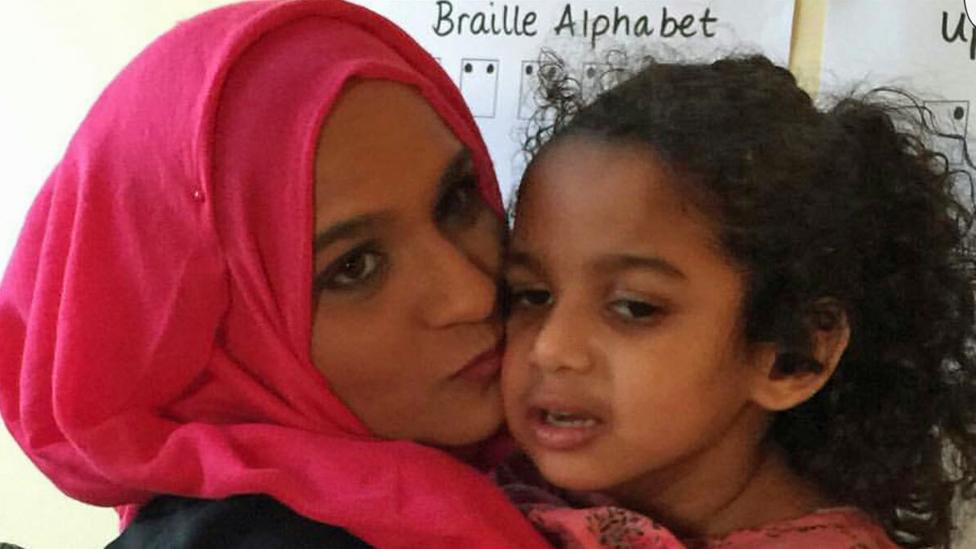
Alea Begum says Khadija's illness did not become apparent until she was one
Another parent who chooses to focus on the positives of a "shocking" situation is Alea Begum, from London, whose daughter Khadija was diagnosed with Argininosuccinic Aciduria at the age of one.
It causes ammonia to accumulate in the blood, which can become toxic if too many proteins are broken down in the body - affecting the nervous system.
She appeared healthy to her parents until she turned one and became progressively ill.
"She was vomiting, so I took her to A&E and they put her to sleep in a coma for two weeks as they found the brain had started to swell.
"When she came around, they said the back of her brain is damaged so she has no vision.
"It was hard, very hard, to accept because she was born normal and then one day it changed everything."
As well as losing her vision, Khadija has permanent brain damage and epilepsy, and her development is delayed.
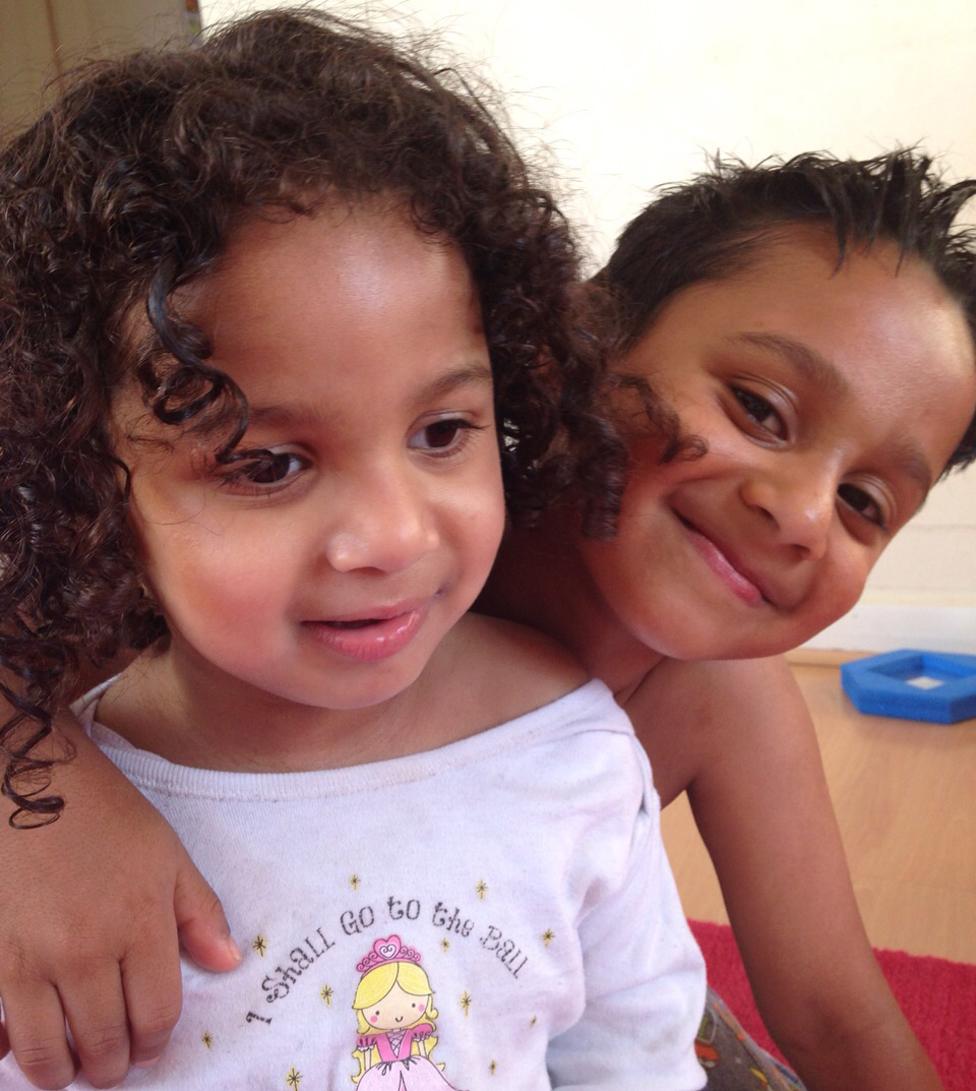
Khadija and her big brother Ismail
Alea says she went to counselling but found that talking about the situation did not help, as she was still "living it".
"I was depressed, I was on medication and I'd have all these flashbacks, and as her mother I blamed myself. Even now, every 5 March, when she went in to hospital, it's like an anniversary and I have a relapse.
"It was hard to come around to the idea that my little girl is never going to see again.
"We do think a lot about her future - is she going to get married, have children? Is she able to study or go to university?"
At five, Khadija is "happy" and at a mainstream school where she is learning Braille. Her mother has qualified as a grief councillor and works for Scope supporting other families.
"When it happened I didn't know anyone with this condition, so it's nice to be in that position to help.
"I see families and they're in pieces and I want to say to them 'in two years you're going to be standing'.
"I thought I was going to lose my daughter. but when it comes to Khadija I'll fight with all my strength."
The mothers in this article are all members of Face 2 Face, external, a free befriending service from the charity Scope which connects parents with disabled children so they can give and receive emotional and practical support.
For more support, the Rare Project , externalfocuses on rare diseases and their impact on children.
Follow BBC Ouch on Twitter, external and Facebook, external, and subscribe to the weekly podcast.